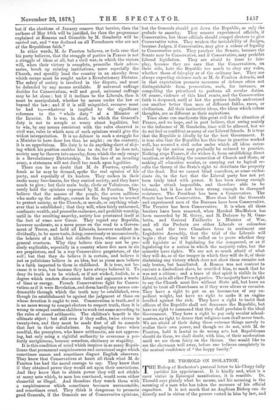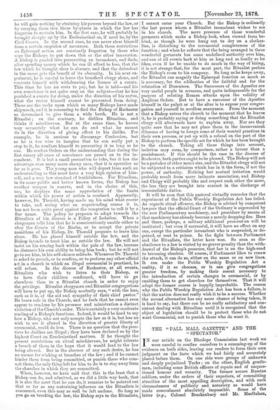DR. THOROLD ON ISOLATION. T HE Bishop of Rochester's pastoral letter
to his Clergy fully justifies his appointment. It is kindly and, what is a rarer virtue in Episcopal manifestoes, it is sensible. Dr. Thorold says plainly what he means, and his meaning is the meaning of a man who has taken the measure of his official capacities. It is not much that an Anglican Bishop can do directly and in virtue of the powers vested in him by law, and he will gain nothing by straining his powers beyond the law, or by carrying them into these by-places in which the law has forgotten to restrain him. In the first case, he will probably be brought sharply up by the Ecclesiastical or, if need be, by the Civil Courts. In the second case, he can never clear himself
from a certain suspicion of meanness. Both these restrictions on Episcopal action are constantly forgotten by those who urge the Bishops to put down this or the other innovation. A Bishop is goaded into prosecuting an incumbent, and finds, after spending money which he can ill afford to lose, that the law which he thought clear is obscure, and that the defendant in the cause gets the benefit of its obscurity. In his next ex- periment, he is careful to leave the beneficed clergy alone, and contents himself with withdrawing the licence of a curate. This time he has no costs to pay, but he is told—and his own conscience is not quite easy on the subject—that he has punished a curate for doing, under the direction of his rector, what the rector himself cannot be prevented from doing. These are the rocks upon which so many Bishops have made shipwreck, and it is reassuring to find the Bishop of Rochester so determined to give them a wide berth. He is not a Ritualist ; on the contrary, ho dislikes Ritualism, and thinks it mischievous. But at the same time, he knows very accurately what he can do and what he cannot do in the direction of giving effect to his dislike. For example, he is anxious to discourage Confession, but as he is too wise to imagine that he can really put a stop to it, he confines himself to preventing it as long as he can. He confers Orders on the understanding that during the first curacy all cases of conscience are passed on to the in- cumbent. It is but a small precaution to take, but it has the advantage over many more showy ones, that it is operative so far as it goes. The young man who will depart from such an understanding as this must have a very high opinion of him- self, and a very low standard of truthfulness. For Ritualism, in its more public and better known forms, the Bishop has another weapon in reserve, and in the choice of this, too, he displays the same appreciation of the limits within which his power of action is confined. Apparently, however, Dr. Thorold, having made up his mind what course to take, and seeing what an unpretending course it is, has not been quite proof against the temptation to call it by a fine name. The policy he proposes to adopt towards the Ritualists of his diocese is a Policy of Isolation. When a clergyman tells him that he is conscientiously unable either to obey the Courts of the Realm, or to accept the private monitions of his Bishop, Dr. Thorold proposes to leave him alone. He has placed himself outside the law, and the Bishop intends to treat him as outside the law. He will not insist on his coming back within the pale of the law, because he distrusts his own ability to bring him back ; but he will not go to see him, in his self-chosen solitude. Whenever Dr. Thorold is asked to preach, or to confirm, or to perform any other official act in a church in which' an illegal ceremonial is practised, he will refuse. In the diocese of Rochester, at all events, Ritualists who wish to listen to their Bishop, or to have their children confirmed, will have to go elsewhere than to a Ritualist church in order to enjoy the privilege. Ritualist clergymen and Ritualist congregations will have to put up, the Bishop modestly says, " with the loss, such as it is, of the aid and sympathy of their chief pastor." He hears rule in the Church, and he feels that he cannot even appear to condone by his presence and ministration a distinct violation of the Church's order. This is certainly a very moderate reading of a Bishop's functions. Indeed, it would be hard to say how a Bishop, who not only accepts the law as it is, but has no wish to see it altered in the direction of greater liberty of ceremonial, could do less. There is no question that the prac- tices he dislikes are illegal ; they have been declared so by the highest Court on Eccclesiastical matters. If he thought the present restrictions on ritual mischievous, he might tolerate a breach of them in the hope that it would lead to the law being altered. But in the absence of any such desire, he has no excuse for winking at breaches of the law ; and if he cannot hinder them from being committed, or punish those who com- mit them, the only thing left for him to do is to stay away from the churches in which they are committed. When, however, we have said that this is the least that a Bishop can do, and admitted, as we did a little way back, that it is also the most that he can do, it remains to be pointed out that so far as any restraining influence on the Ritualists is concerned, even this may as well be left undone. So long as you go on breaking the law, the Bishop says to the Ritualists, I cannot enter your Church. But the Bishop is ordinarily the last person whom a Ritualist incumbent wishes to see in his church. The mere presence of those wonderful garments which make a Bishop look, when viewed from be- hind, as though he were hung out to dry on a clothes- line, is disturbing to the ceremonial completeness of the function ; and when he reflects that the being arranged in these wonderful garments has some undefined authority over him, and can at all events bark at him as long and as loudly as he likes, even if he be unable to do much in the way of biting, it is not strange that, for the most part, the Ritualist prefers the Bishop's room to his company. So long as he keeps away, the Ritualist can magnify the Episcopal function as much as is necessary, for the edification of the faithful and for the refutation of Dissenters. The Successors of the Apostles are very useful people in sermons, and quite indispensable for the purpose of refuting Roman attacks upon the validity of Anglican Orders. But to have a successor of the Apostles himself in the pulpit or at the altar is to expose your congre- gation and yourself to needless annoyance. From the moment that a Bishop enters the church to the moment that he leaves it, he is probably saying or doing something that the Ritualist clergy will afterwards have to explain away. Nor are they quite sure that he may not place them in the inconvenient dilemma of having to forego some of their wonted practices in their own persons, or put up with a refusal on the part of the Bishop to perform the specific act for which he has been brought to the church. Taking all these things into account, isolation may seem, by comparison, rather a favour than a punishment. If this should be the case in the diocese of Rochester, both parties ought to be pleased. The Bishop will not be a partaker of other men's sins, and the Ritualist clergy will not be subjected to a criticism which has in it the form, if not the power, of authority. Nothing but mutual irritation would probably result from more intimate association, and Bishop and Clergy will probably like and respect each other the more, the less they are brought into contact in the discharge of irreconcilable duties.
It will be seen that this pastoral virtually concedes that the experiment of the Public Worship Regulation Act has failed. As regards ritual offences, the Bishop is advised by competent lawyers that the official Court of the Ordinary is superseded by the new Parliamentary machinery, and procedure by means of that machinery has already become a merely dropping fire. Here and there, perhaps, a solitary additional prosecution will be instituted ; but even if successful, it will have no effect on any one, except the particular incumbent who is suspended, or de- prived, or sent to /Risen. In the fight between Parliament and the Ritualists, the latter have won. So soon as dis- obedience to a law is visited by no graver penalty than the with- drawal of the Bishop's presence, that law is on the high-road to becoming obsolete. Of course, if Parliament likes to renew the attack, it can do so, either on the same or on new lines. It can make the Public Worship Regulation Act a reality, if it so chooses, or it can give congregations greater freedom, by making their assent necessary to the introduction of certain changes in ceremonial, or by enabling them to get churches for themselves. That it will adopt the former course is happily, improbable. The reason why the Public Worship Regulation Act has been a failure, is that the nation does not really wish it to be a success. Whether the second alternative has any more chance of being taken, it is hard to say, but there can be no really satisfactory and con- sistent dealing with Ritualism until it is recognised that the object of legislation should be to protect those who do not want Ceremonial, not to punish those who do want it.



































 Previous page
Previous page